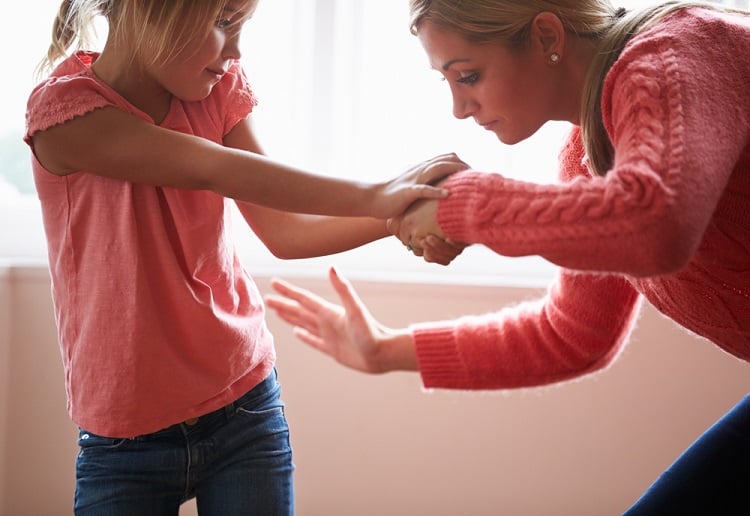Why parents should never spank children.
There is no research evidence that spanking improves child behaviour. On the contrary, spanking is associated with aggression, antisocial behaviour, mental health problems and negative relationships with parents.
Spanking — usually defined as hitting a child on the buttocks with an open hand — is a common form of discipline still used on children worldwide. However, to date, spanking has been banned in 53 countries and states globally.
The use of spanking has been hotly debated over the last several decades. Supporters state that it is safe, necessary and effective; opponents argue that spanking is harmful to children and violates their human rights to protection.
As two scholars with extensive research experience and clinical insight in the field of child maltreatment, and with specific expertise related to spanking, we would like to move beyond this debate.
The research clearly shows that spanking is related to an increased likelihood of many poor health, social and developmental outcomes. These poor outcomes include mental health problems, substance use, suicide attempts and physical health conditions along with developmental, behavioural, social and cognitive problems. Equally important, there are no research studies showing that spanking is beneficial for children.
Those who say spanking is safe for a child if done in a specific way are, it would seem, simply expressing opinions. And these opinions are not supported by scientific evidence.
The evidence on spanking
There have now been hundreds of high-quality spanking research studies with a wide variety of samples and study designs. Over time, the quality of this research has improved to include better spanking measures and more sophisticated research designs and statistical methods.

(Shutterstock)
The scientific evidence from these studies has consistently shown that spanking is related to harmful outcomes for children.
This has been best demonstrated in two landmark meta-analyses led by Dr. Elizabeth Gershoff. The first paper, published in 2002, reviewed and analyzed 88 studies published in the 62 years prior and found that physical punishment was associated with physical abuse, delinquency and antisocial behaviour.
An updated meta-analysis was most recently published in 2016. This reviewed and analyzed 75 studies from the previous 13 years, concluding that there was no evidence that spanking improved child behaviour and that spanking was associated with an increased risk of 13 detrimental outcomes. These include aggression, antisocial behaviour, mental health problems and negative relationships with parents.
We now have data that clearly demonstrates that spanking is not safe, nor effective. Of course this does not make parents who have used spanking bad parents. In the past, we simply did not know the risks.
Towards positive parenting strategies
Evidence from over 20 years of research consistently indicates the harms of spanking. There is also increasing global recognition of the rights of children to protection and dignity, as inscribed in the UN Convention on the Rights of the Child and in targets within the UN Sustainable Development Goals (SDGs) to eliminate violence. Taken together, these tell us that spanking should never be used on children or adolescents of any age.
It is important, now, to find ways to help parents use positive and non-physical strategies with their children. Research already shows some evidence that parenting programs specifically aimed at preventing physical punishment can be successful.
Some evidence for reducing harsh parenting and physical punishment has been found for Parent-Child Interaction Therapy (PCIT), the Incredible Years (IY) program and the Nurse Family Partnership (NFP). Other promising home visiting initiatives and interventions taking place in community and paediatric settings are also being examined for proven effectiveness.
![]() As researchers, we also need to reframe the research we are conducting, the questions we are asking and the discussions we are having — to move this field forwards and to ensure the safety and well-being of children.
As researchers, we also need to reframe the research we are conducting, the questions we are asking and the discussions we are having — to move this field forwards and to ensure the safety and well-being of children.
The academic journal Child Abuse & Neglect has published a special issue, containing original research and discussion papers containing further strategies. It is free to all readers for a limited time.
Tracie O. Afifi, Associate Professor, University of Manitoba and Elisa Romano, Full Professor of Clinical Psychology, University of Ottawa
This article was originally published on The Conversation. Read the original article.




















-

-
-
june11 said
- 11 Nov 2017
-

-
-
Ellen said
- 02 Nov 2017

-

-
-
nadine_hill said
- 01 Nov 2017
-

-
-
nat_nat said
- 01 Nov 2017
-

-
-
BellaB said
- 01 Nov 2017
-

-
-
country chick said
- 01 Nov 2017
-

-
-
youngoldlady said
- 31 Oct 2017
-

-
-
ashna9 said
- 31 Oct 2017
-

-
-
Kasey said
- 31 Oct 2017
-

-
-
mom160421 said
- 31 Oct 2017
-

-
-
mom206279 said
- 31 Oct 2017
-

-
-
mom90758 said
- 31 Oct 2017
Post a comment8:17 pm
-

-
-
Shazza replied
- 17 Nov 2017 , 11:37 am
Reply4:03 am
12:18 pm
10:37 am
9:45 am
7:26 am
-

-
-
mom90758 replied
- 01 Nov 2017 , 3:10 pm
Reply11:36 pm
7:36 pm
6:42 pm
5:48 pm
4:10 pm
2:11 pm
To post a review/comment please join us or login so we can allocate your points.